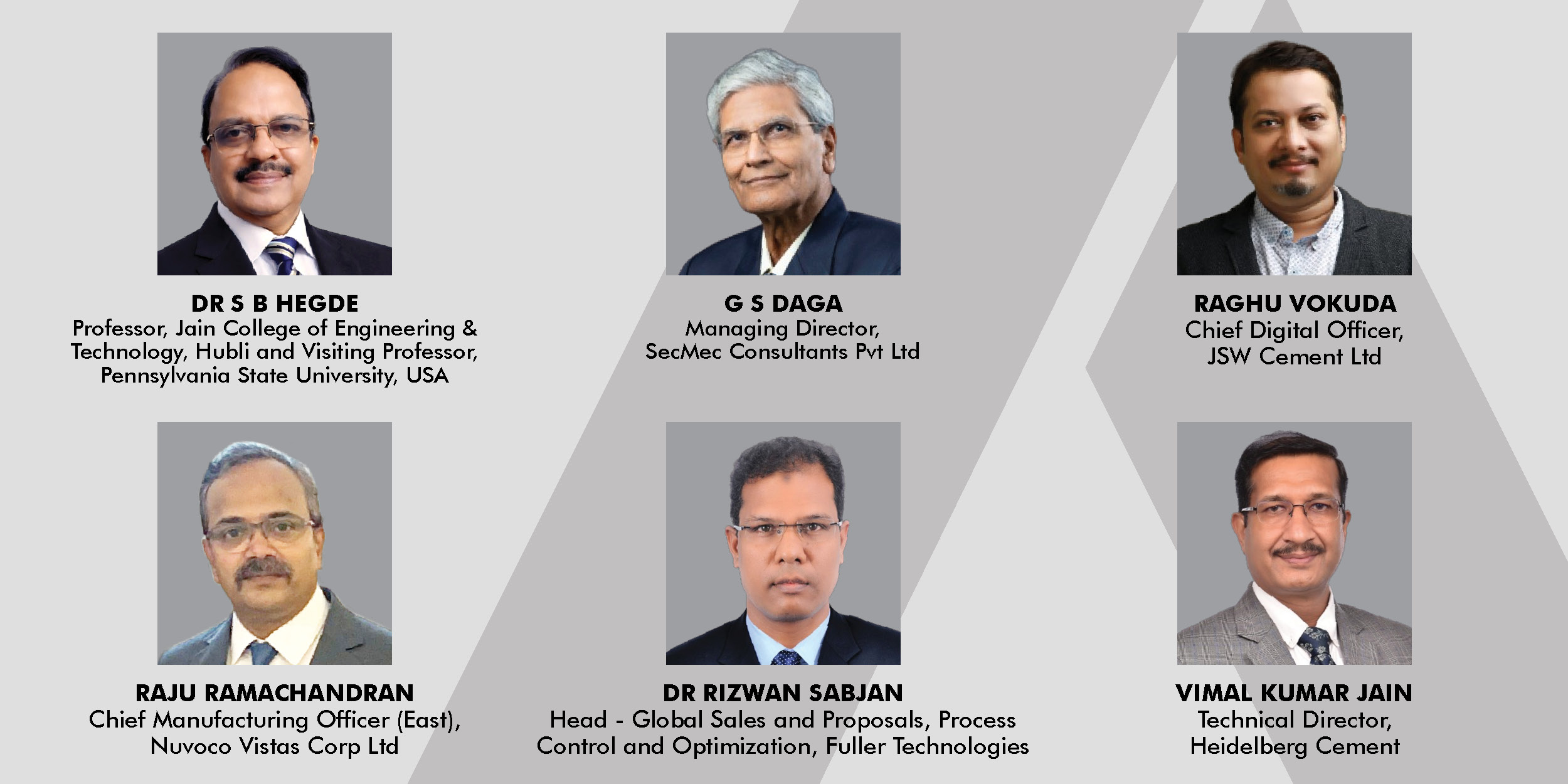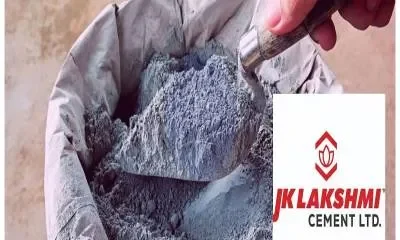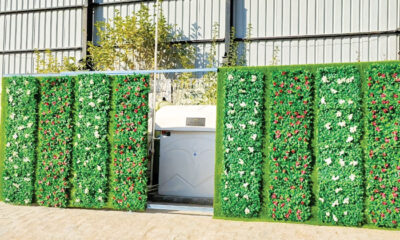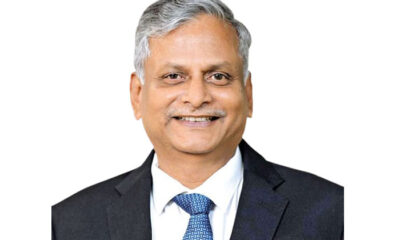Concrete
We believe that every step makes a significant impact
Published
4 years agoon
By
admin
Shashikant Kumar, General Manager (HR & IR), Udaipur Cement Works (a subsidiary of JK Lakshmi Cement), speaks about initiates taken and challenges faced in implementing corporate social responsibility programmes.
What is the vision of your organisation in terms of CSR?
To strengthen community relationships and to bring sustainable change in the quality of life of neighbourhood communities through innovative solutions in education, health, livelihood and community development. We define Corporate Social Responsibility (CSR) as the way a company balances its economic, social and environmental objectives, while addressing stakeholder expectations and enhancing shareholder value.
In continuation of the philosophy followed by JK Lakshmi Cement of giving back to the society much before the term corporate social responsibility was coined, Udaipur Cement Works, too, is actively involved towards social causes since its inception by working towards enriching the community living around the plants and mines, especially where the weaker sections of rural and tribal population have limited access to even the basic amenities. The community sustainable development programmes aim at the integrated development of such villages.
How does your organisation zero down on the projects it decides to take up for CSR activities?
CSR action plan is based on the survey reports, consultations with stakeholders and need identification. Based on this mapping, UCWL works closely with the communities to help prioritise their needs in three categories i.e., immediate plan, short term plan and long-term plan, so that the initiatives have effective and positive outcomes for the benefit of the community at large.
Tell us about the budgets allocated for CSR in the current and next financial year.
The procedure for budget allocation is based on priorities and need based analysis of the community. We do ensure that the allotted budget is utilised for the purpose and in the manner for which it is approved and expected to spend within that financial year. Our main verticals for CSR fund are health, water facility, education, learning and skill development. These verticals are covered under different projects such as UCWL Aryogya, UCWL Vidya Project, UCWL Kaushal Prashikshan Project, UCWL Swajal and Swachata Project and UCWL Gramin Vikas Project.
What social responsibilities and community building programmes are your organisations currently working on?
The major focus areas of intervention are education, healthcare, livelihood and community development and commitment towards the social cause which is positively contributing towards human development index.
What significant changes have your CSR activities brought in communities you support?
We believe that every small step makes a significant impact under social responsibility and community development. We created a real life changing story by supporting the community. During the Covid-19 period, we helped them out by distribution of masks, sanitiser and food kits. We are trying to cover all relevant subjects for community support such as skill development, education on sanitation, literacy, eye care, oral hygiene
Few examples are:
For Livelihood:
- Selection of 75 Micro/ Small farmers
- Six Workshops on ‘Agriculture Input for Rabi Crop’ participated by 125 beneficiaries
- Soil testing at State Government Laboratory of all 75 Micro- Small farmers beneficiaries
- Developed 75 Individual Farmer Development Plan
- Pesticides support to 16 farmers
- Door-to-door Veterinary Programme wherein 1711 cattle treated for free, and which
benefited 454 cattle owners
- Veterinary Camp treated over 50 cattle
- 25 girls were trained in the 6-month training programme and 14 placed in BPO sector
- 26 Women beneficiaries trained in stitching
Community Infra:
- Electrification of six Aanganwadi around the mines’ periphery
- Toilet facility at Government Senior Secondary School, Mandesar
- Repair and maintenance of Government Primary School, Talai, Mandesar
Medical
- Organised 15 Medical Camps,which benefited 602 patients
- Organised 2 Eye Camps, wherein 249 patients underwent eye check-up and 53 patients were provided with spectacles
- Cotton masks, oximeter and PPE kits were provided to four Gram Panchayats, three hospitals and one government school
Tell us about the steps taken by your organisation to achieve net zero. How far have you achieved your targets?
Serving the society towards improving the quality of life of the community at large has always been a priority of the company. The concept of socially responsible business is deeply ingrained into our corporate DNA right from the initial years and till date we have pioneered and delivered several CSR projects for needy and vulnerable communities and families. The company works towards overall development and welfare of the society by focusing on areas such as health, sanitation, water, education, skill development and livelihood interventions. As the beginning of the financial year saw the outbreak of Covid-19 pandemic, the company responded to this unprecedented crisis by taking several initiatives in collaboration with local panchayats and district administration. Number of food kits, sanitisers, cotton masks and hand wash were distributed to the needy families as well as sessions and meetings were organised to create awareness on Covid-19. The company also undertook multiple CSR activities like medical camps, skills training for the women and girls and supporting them for income earning under its flagship project ‘Swavalamban’, among others. Projects like farmers’ training, exposure visits and veterinary camps were organised to improve agricultural and cattle rearing practices to strengthen livelihoods of the marginalised families. These CSR projects have positively impacted the lives of the beneficiaries around the plant.
What is the expertise you employ to implement your CSR plans?
Currently we have recruited CSR professionals having more than 10 years of experience in
the development sector and two project experts as consultants.
How has the pandemic impacted your community building activities?
We stood up strongly with our stakeholders and nearby community. Although activities were stuck for a small period during complete lock down when movement was restricted. However, it was momentary. That time was crucial for everyone from an individual to an industry, everyone. Overall, the pandemic was a lesson for all of us and an opportunity for awareness among people about the importance of hygiene and sanitisation. We met with the local panchayat and district administration. We conducted awareness sessions, distributed a number of food kits, sanitisers and cotton masks for safety towards Covid-19 pandemic.
Tell us about the awards and accolades won by your organisation for CSR.
- UCWL recognised with ‘National Award for Excellence under CSR in Best Community Action Category’
- UCWL was awarded ‘Winner for 8th CSR India Award 2021’
- UCWL received an Appreciation Certificate for contribution in ‘Ghar Ghar Aushadhi Vitran
Yojna’ of the Department of Forest; Government of Rajasthan. This scheme was designed for distribution of medicinal plants to state citizens.
What are the future plans for building communities and giving back to society?
Currently we are working in 6 villages only and planning to increase the number of villages to 27, with an integrated approach of socio-economic development for the community. Some major proposed projects are as mentioned below:
Project 1
Name of CSR Projects Project Planned Activities Frequency of activity Total number of units
UCWL Aarogya Project,
Purpose Statement: To deliver affordable/quality health care services & door stapes MMU MMU modal in partnership with H2H foundation 2 Camps per day (Monthly 25*2 camps) 600
Project 2
Name of CSR Projects Project Planned Activities Frequency of activity Total number of units
UCWL Vidya Project,
Purpose Statement: To support around 300 needy students with a school kits simultaneously support Govt schools in primarily mines area with teachers support to bridge the shortfalls of teachers
Education School kit support – in 3 Govt primary Schools One time 300
Teacher support – 5 Govt Sr Secondary Schools Monthly 2
Repair & maintenance of Govt up-primary school, Bajajnagar – Plant area One time 1
PCC work @ Govt Primary school, Talai One time 1
Project 3
Name of CSR Projects Project Planned Activities Frequency of activity Total number of units
UCWL Aajivika Project,
Purpose Statement: Promoting Farm & Allied livelihoods through institution building, capacity building, skill development training, support services & other related initiatives. Animal Husbandry Door to door vet service Monthly 2500
Artificial insemination for cattle Monthly 1428
Vet Camp (Daroli, Toos, Ghupadi & Majawada) Qtr 16
Project 4
Name of CSR Projects Project Planned Activities Frequency of activity Total number of units
UCWL Aajivika Project,
Purpose Statement: Promoting Farm & Allied livelihoods through institution building, capacity building, skill development training, support services & other related initiatives. Agriculture Development Agriculture Development Setting up Vermi Bed (Soil Improvement) One time 50
Capacity Building & Training of Farmers Monthly 24
Seed & pest support Twice in a Year 30
Exposure visit – Other district / State One time 50
Exposure visit – Inter district One time 50
Spray Pump with motor One time 4
Repair & maintenance cost of spray pumps One time 4
Spray Pump manual One time 4
Repair & maintenance cost of spray pumps One time 4
Plantation (SA) One time 1000
Access to Govt scheme One time 35
Training on Agri-allied activity to promote small business like Goatry/ Poultry/ Rabbit Keeping / Beekeeping / Mushroom Farming / Dairy Development – AI One time 60
Support to trained beneficiaries of agri-alied activity to promote small business – Goatry/ Poultry/ Rabbit Keeping / Beekeeping / Mushroom Farming / AI One time 30
Project 5
Name of CSR Projects Project Planned Activities Frequency of activity Total number of units
UCWL Kaushal Parshikshan Project,
Purpose Statement: Provide Skill training & coaching support to 350 youths in various trades. Skill Development RSCIT – Rajasthan State Course In Information Technology Diploma to increase the IT education level for Job Readiness.
Three months training, Examination & certification Qtr 120
Skill training for women (Beautician & Tailoring) Qtr 120
Salary of teacher Competitive / coaching classes & other running exp Monthly 50
Projector One time 1
Computer for teacher One time 1
Training in Technical trades Qtr 10
-Kanika Mathur

Operational excellence in cement is no longer about producing more—it is about producing smarter, cleaner and more reliably, where cost per tonne meets carbon per tonne.
Operational excellence in cement has moved far beyond the old pursuit of ‘more tonne’. The new benchmark is smarter, cleaner, more reliable production—delivered with discipline across process, people and data. In an industry where energy can account for nearly 30 per cent of manufacturing cost, even marginal gains translate into meaningful value. As Dr SB Hegde, Professor, Jain College of Engineering & Technology, Hubli and Visiting Professor, Pennsylvania State University, USA, puts it, “Operational excellence… is no longer about producing more. It is about producing smarter, cleaner, more reliably, and more sustainably.” The shift is structural: carbon per tonne will increasingly matter as much as cost per tonne, and competitiveness will be defined by the ability to stabilise operations while steadily lowering emissions.
From control rooms to command centres
The modern cement plant is no longer a handful of loops watched by a few operators. Control rooms have evolved from a few hundred signals to thousands—today, up to 25,000 signals can compete for attention. Dr Rizwan Sabjan, Head – Global Sales and Proposals, Process Control and Optimization, Fuller Technologies, frames the core problem plainly: plants have added WHRS circuits, alternative fuels, higher line capacities and tighter quality expectations, but human attention remains finite. “It is very impossible for an operator to operate the plant with so many things being added,” he says. “We need somebody who can operate 24×7… without any tiredness, without any distraction… The software can do that for us better.”
This is where advanced process control shifts from ‘automation spend’ to a financial lever. Dr Hegde underlines the logic: “Automation is not a technology expense. It is a financial strategy.” In large kilns, a one per cent improvement is not incremental—it is compounding.
Stability is the new productivity
At the heart of operational excellence lies stability. Not because stability is comfortable, but because it is profitable—and increasingly, low-carbon. When setpoints drift and operators chase variability, costs hide in refractory damage, thermal shocks, stop-start losses and quality swings. Dr Sabjan argues that algorithmic control can absorb process disturbances faster than any operator, acting as ‘a co-pilot or an autopilot’, making changes ‘as quick as possible’ rather than waiting for manual intervention. The result is not just fuel saving—it is steadier operation that extends refractory life and reduces avoidable downtime.
The pay-off can be seen through the lens of variability: manual operation often amplifies swings, while closed-loop optimisation tightens control. As Dr Sabjan notes, “It’s not only about savings… there are many indirect benefits, like increasing the refractory life, because we are avoiding the thermal shocks.”
Quality control
If stability is the base, quality is the multiplier. A high-capacity plant can dispatch enormous volumes daily, and quality cannot be a periodic check—it must be continuous. Yet, as Dr Sabjan points out, the biggest error is not in analysis equipment but upstream: “80 per cent of the error is happening at the sampling level.” If sampling is inconsistent, even the best XRF and XRD become expensive spectators.
Automation closes the loop by standardising sample collection, transport, preparation, analysis and corrective action. “We do invest a lot of money on analytical equipment like XRD and XRF, but if it is not put on the closed loop then there’s no use of it,” he says, because results become person-dependent and slow.
Raju Ramachandran, Chief Manufacturing Officer (East), Nuvoco Vistas Corp, reinforces the operational impact from the plant floor: “There’s a stark difference in what a RoboLab does… ensuring that the consistent quality is there… starts right from the sample collection.” For him, automation is not about removing people; it is about making outcomes repeatable.
Human-centric automation
One of the biggest barriers to performance is not hardware—it is fear. Dr Sabjan describes a persistent concern that digital tools exist to replace operators. “That’s not the way,” he says. “The technology is here to help operator… not to replace them… but to complement them.” The plants that realise this early tend to sustain performance because adoption becomes collaborative rather than forced.
Dr Hegde adds an important caveat: tools can mislead without competence. “If you don’t have the knowledge about the data… this will mislead you… it is like… using ChatGPT… it may tell the garbage.” His point is not anti-technology; it is pro-capability. Operational excellence now requires multidisciplinary teams—process, chemistry, physics, automation and reliability—working as one.
GS Daga, Managing Director, SecMec Consultants, takes the argument further, warning that the technology curve can outpace human readiness: “Our technology movement AI will move fast, and our people will be lagging behind.” For him, the industry’s most urgent intervention is systematic skilling—paired with the environment to apply those skills. Without that, even high-end systems remain underutilised.
Digital energy management
Digital optimisation is no longer confined to pilots; its impact is increasingly quantifiable. Raghu Vokuda, Chief Digital Officer, JSW Cement, describes the outcomes in practical terms: reductions in specific power consumption ‘close to 3 per cent to 7 per cent’, improvements in process stability ‘10 per cent to 20 per cent’, and thermal energy reductions ‘2–5 per cent’. He also highlights value beyond the process line—demand optimisation through forecasting models can reduce peak charges, and optimisation of WHRS can deliver ‘1 per cent to 3 per cent’ efficiency gains.
What matters is the operating approach. Rather than patchwork point solutions, he advocates blueprinting a model digital plant across pillars—maintenance, quality, energy, process, people, safety and sustainability—and then scaling. The difference is governance: defined ownership of data, harmonised OT–IT integration, and dashboards designed for each decision layer—from shopfloor to plant head to network leadership.
Predictive maintenance
Reliability has become a boardroom priority because the cost of failure is blunt and immediate. Dr Hegde captures it crisply: “One day of kiln stoppage can cost several crores.” Predictive maintenance and condition monitoring change reliability from reaction to anticipation—provided plants invest in the right sensors and a holistic architecture.
Dr Sabjan stresses the need for ‘extra investment’ where existing instrumentation is insufficient—kiln shell monitoring, refractory monitoring and other critical measurements. The goal is early warning: “How to have those pre-warnings… where the failures are going to come… and then ensure that the plant availability is high, the downtime is low.”
Ramachandran adds that IoT sensors are increasingly enabling early intervention—temperature rise in bearings, vibration patterns, motor and gearbox signals—moving from prediction to prescription. The operational advantage is not only fewer failures, but planned shutdowns: “Once the shutdown is planned in advance… you have lesser… unpredictable downtimes… and overall… you gain on the productivity.”
Alternative fuels and raw materials
As decarbonisation tightens, AFR becomes central—but scaling it is not simply a procurement decision. Vimal Kumar Jain, Technical Director, Heidelberg Cement, frames AFR as a structured programme built on three foundations: strong pre-processing infrastructure, consistent AFR quality, and a stable pyro process. “Only with the fundamentals in place can AFR be scaled safely—without compromising clinker quality or production stability.”
He also flags a ground reality: India’s AFR streams are often seasonal and variable. “In one season to another season, there is major change… high variation in the quality,” he says, making preprocessing capacity and quality discipline mandatory.
Ramachandran argues the sector also needs ecosystem support: a framework for AFR preprocessing ‘hand-in-hand’ between government and private players, so fuels arrive in forms that can be used efficiently and consistently.
Design and execution discipline
Operational excellence is increasingly determined upstream—by the choices made in concept, layout, technology selection, operability and maintainability. Jain puts it unambiguously: “Long term performance is largely decided before the plant is commissioned.” A disciplined design avoids bottlenecks that are expensive to fix later; disciplined execution ensures safe, smooth start-up with fewer issues.
He highlights an often-missed factor: continuity between project and operations teams. “When knowledge transfer is strong and ownership carries beyond commissioning, the plant stabilises much faster… and lifecycle costs reduce significantly.”
What will define the next decade
Across the value chain, the future benchmark is clear: carbon intensity. “Carbon per ton will matter as much as cost per ton,” says Dr Hegde. Vokuda echoes it: the industry will shift from optimising cost per tonne to carbon per ton.
The pathway, however, is practical rather than idealistic—low-clinker and blended cements, higher thermal substitution, renewable power integration, WHRS scaling and tighter energy efficiency. Jain argues for policy realism: if blended cement can meet quality, why it shall not be allowed more widely, particularly in government projects, and why supplementary materials cannot be used more ambitiously where performance is proven.
At the same time, the sector must prepare for CCUS without waiting for it. Jain calls for CCUS readiness—designing plants so capture can be added later without disruptive retrofits—while acknowledging that large-scale rollout may take time as costs remain high.
Ultimately, operational excellence will belong to plants that integrate—not isolate—the levers: process stability, quality automation, structured AFR, predictive reliability, disciplined execution, secure digitalisation and continuous learning. As Dr Sabjan notes, success will not come from one department owning the change: “Everybody has to own it… then only… the results could be wonderful.”
And as Daga reminds the industry, the future will reward those who keep their feet on the ground while adopting the new: “I don’t buy technology for the sake of technology. It has to make a commercial sense.” In the next decade, that commercial sense will be written in two numbers—cost per tonne and carbon per tonne—delivered through stable, skilled and digitally disciplined operations.
Concrete
World Cement Association Annual Conference 2026 in Bangkok
Global leaders to focus on decarbonisation and digitisation
Published
3 days agoon
March 2, 2026By
admin
The World Cement Association (WCA) will host its 2026 Annual Conference from 19–21 April 2026 at The Athenee Hotel in Bangkok, Thailand. The two-day programme will convene global cement industry leaders, policymakers, technology providers and stakeholders to examine strategic, operational and sustainability challenges shaping the sector’s next phase of transformation. The conference theme of shaping a sustainable future through digitisation, innovation and performance will frame sessions and networking opportunities across the event.\n\nThe programme will open with a comprehensive assessment of the global economic environment and its impact on cement markets, alongside regional outlooks across Asia and Europe. Speakers will address regulatory developments including carbon border adjustment mechanisms (CBAM) in Europe, progress in China’s carbon trading system and market dynamics in Thailand and South East Asia, and will outline practical decarbonisation pathways such as alternative fuels, next-generation supplementary cementitious materials (SCMs) and calcined clay developments. Sessions will also examine AI-enabled kiln optimisation and other digital approaches to improve plant performance.\n\nDay two will focus on overcapacity challenges and industry restructuring, using case studies and regional perspectives to provide delegates with practical insights into unlocking performance while accelerating decarbonisation. Discussions will explore digital maturity and AI-driven plant operations, manufacturing optimisation, sustainable building solutions and circular concrete models, together with evolving customer requirements across the construction value chain. The event will include the WCA Awards Ceremony at the Awards Gala Dinner on 20 April to recognise excellence in sustainability, innovation, safety and leadership.\n\nPhilippe Richart, chief executive officer of the WCA, said the sector was navigating a period of profound transformation, from managing overcapacity and market volatility to deploying AI and delivering measurable decarbonisation, and that the Annual Conference would bring global leaders together to exchange practical solutions and strengthen collaboration. Registration is open and tickets include admission to the two-day event, all sessions, refreshments and lunch, exhibition access and the Awards Gala Dinner. Further information on the programme is available via the WCA Annual Conference 2026 event page and queries on sponsorship or exhibition may be directed to events@worldcementassociation.org.
Concrete
Assam Chief Minister Opens Star Cement Plant In Cachar
New plant aims to boost local industry and supply chains
Published
3 days agoon
March 2, 2026By
admin
Chief Minister Himanta Biswa Sarma inaugurated the Star Cement plant in Cachar on 28 February 2026, marking the opening of a manufacturing facility designed to serve the region. The event was attended by state officials and company representatives, and it was reported with inputs from ANI. The plant is positioned as a strategic addition to the industrial landscape of southern Assam and is expected to improve the availability of construction materials for local projects.
The establishment is expected to generate employment opportunities and to stimulate ancillary businesses in the supply chain, including transport and local vendors. State officials indicated that the plant will enhance logistical efficiency by reducing the need to transport cement over long distances, which may lower construction costs for public and private projects. Observers said the presence of a regional cement facility can support housing and infrastructure initiatives that are underway or planned.
Government representatives reiterated that the state seeks to attract responsible investment that complements regional priorities and that the administration will continue to facilitate infrastructure and connectivity to support industrial operations. The inauguration was presented as consistent with broader efforts to diversify the industrial base in the northeast and to create an enabling environment for small and medium enterprises that supply goods and services to larger manufacturers.
Company sources and the state leadership underlined the importance of maintaining environmental safeguards while pursuing industrial growth, and they signalled that compliance with applicable norms will be a priority at the new facility. The announcement was framed as a step towards balanced development that links job creation, regional supply chains and local economic resilience. The report was prepared by the TNM Bureau with inputs from ANI.

Operational Excellence Redefined!

World Cement Association Annual Conference 2026 in Bangkok

Assam Chief Minister Opens Star Cement Plant In Cachar

Adani Cement, NAREDCO Form Strategic Alliance

Walplast’s GypEx Range Secures GreenPro Certification

Operational Excellence Redefined!

World Cement Association Annual Conference 2026 in Bangkok

Assam Chief Minister Opens Star Cement Plant In Cachar

Adani Cement, NAREDCO Form Strategic Alliance
























